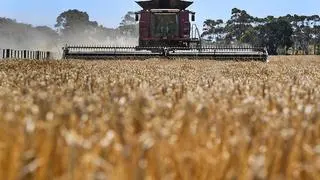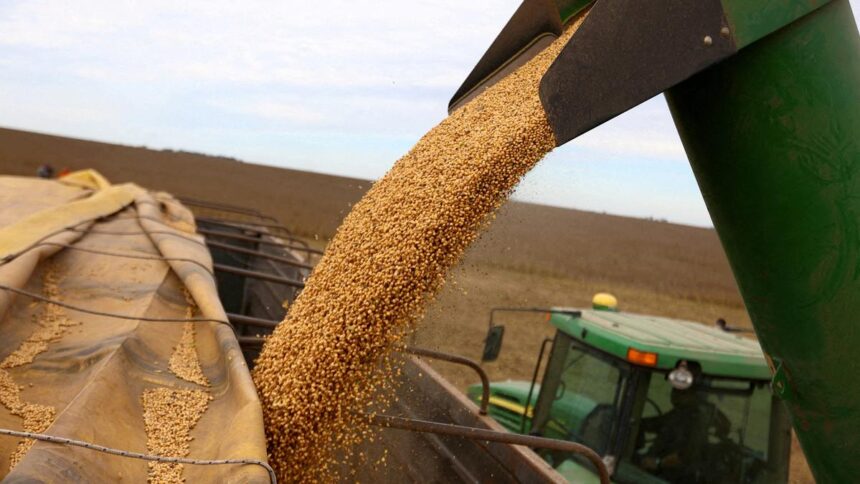
The soybeans are loaded in a truck after being harvested, in Pergamino, on the outskirts of Buenos Aires, Argentina, May 15, 2024 | Photo credit: Matias Baglietto
Donald Trump’s tariffs will make many things more exenses for their American fellow citizens. The price of imported cars, construction materials and some technology will increase, and so will the cost of food at the US dining tables.
Currently, the United States imports around 16 percent of its food supply, with a large proportion of its fruits and vegetables from countries now affected by rates.
Mexico stands out. It supplies approximately half of fresh fruit and almost 70 percent of fresh vegetables consumed in the US.
And when it comes to local products, the United States still depends on imported fertilizers for its crops, with Canada providing up to 85 percent of its neighbor’s supply.
Therefore, edible bills for American families, especially for fresh products (and processed foods that depend on foreign ingredients) will be higher. But there will also be a remarkable effect on food prices outside the United States.
The consequences could be involvedly serious for developing economies that depend on stable international prices to ensure affordable food imports. The prices of many global basic foods, including corn, wheat and soybeans, are compared to US markets, so when interruptions occur, they reverberate worldwide.
The research I did with a colleague discovered that when international prices are disturbed, local food prices, especially in developing countries, increase.
I took the world prices of corn, which year increased by 7 percent between April 2 (Trump’s “Liberation Day) and April 11. Our study will immediately lead to a similar increase in local corn prices in places such as sub -Saharan Africa.
This is where many of the worlds in the world live, with hundreds of millions in homes that earn the world bank’s poverty line of $ 2.15 (£ 1.61) per day. When much of that income is spent on food, a 7 percent increase in the price of corn could be devastating.
Growth market
According to another study, tariffs on agricultural products such as fertilizer will increase global production costs, potentially reduce crop yields and worship food insecurity.
Although the United States has reduced tariffs on Canadian potassa from 25 percent to 10 percent, other fertilizer producers face more pronounced levels (up to 28 percent for another important exporter, Tunisia, before Trump’s reciprocal tariffs were paused).
This is special worrying for agriculture in countries such as Brazil, India and Nigeria, which are still recovering from the scarcity of fertilizers caused by the war between Russia and Ucrine. As with food costs, American tariffs are likely to generate prices in the world fertilizer market, which makes it more expectation for everyone, everywhere.
And when the cost of agriculture increases, crop production can suffer. This could significantly give food production in developing countries that are already struggling against climate change and volatile markets.
Another study that I did found that countries such as the Democratic Republic of Congo and Somalia, which already fight with food insecurity, are among the most vulnerable to local clashes of food prices. These economies are branched in food imports and face high exposure to monetary fluctuations and transport costs.
If the commercial war intensifies, farmers in these regions can be forced to abandon basic crops due to cash products, such as cocoa or coffee, deepening their dependence on volatile global markets and reducing their food self -sufficiency. Global inequality will become unless things change.
An option would be to protect essential agricultural imports, special fertilizers and basic foods, punitive tariffs. This would stabilize prices and protect vulnerable economies. The recent announced pause of 90 days for negotiations sacrifices a ray of hope, but should be used wisely to build a more equitable commercial system.
In the long term, developing countries need to strengthen the resilience of their food systems. My research recommends investing strongly in mechanized agriculture, which is resistant to climate change, incentive farmers with government support and the strengthening of regional trade.
The global food system is interconnected. Decisions taken in Washington can quickly affect food prices in Lagos, Cairo and New Delhi. And if tariffs are not controlled, they can unleash a silent and subtle crisis, a measure not in GDP, but in millions of empty stomachs.
(By Lotanna Emediegwu, Professor of Economics, Metropolitan University of Manchester)
More like this

Posted on May 3, 2025










